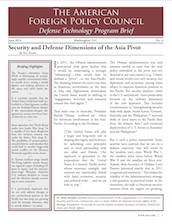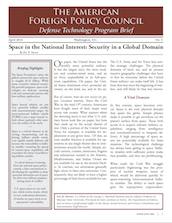Iran Democracy Monitor: No. 148
Iran leads in misery;
An addicted government?;
A looming water crisis;
Food supplies, stuck in transit;
Iranian drones on the Syrian battlefield
Iran leads in misery;
An addicted government?;
A looming water crisis;
Food supplies, stuck in transit;
Iranian drones on the Syrian battlefield
Major attack in Urumqi, Xinjiang;
People’
s Daily laments influx of English words in Chinese language
Crimea as casus belli;
Moscow steps up activity in the Pacific
Cairo eliminates El-Sissi's opposition in upcoming elections;
Libya parliament elects 5th transitional Prime Minister;
Egypt sentences top MB leader to death;
U.S. recognizes Syria opposition offices as 'foreign mission';
Hamas frees six Fatah prisoners as part of unity pact;
Qatar expels Muslim Brotherhood members
China warns SCO of link between terrorism and drugs;
China says no to Indian consulate in Tibet

There is no question that the United States faces significant and increasing security challenges in the Asia-Pacific region, including the growing threat posed by ballistic missiles and their payloads. It is fair to argue that China is increasingly confident and assertive in addressing its perceived national interests, supported by its expanding military might and power projection capabilities. From appearances, it is also reasonable to assert that North Korea is not on a path to openness, reform, and reconciliation with its neighbors. As such, it is critical that the United States provide for its national defense in the Pacific...
Human rights and liberal values are under threat in a small, little-known country most people would be hard-pressed to find on a map. Brunei Darussalam, following the radical vision of Usama bin Laden and his followers, became an Islamic state under strict Sharia law this past week, with punishments of death by stoning for adulterers and severing of limbs for thieves. Policymakers on both sides of the Atlantic have yet to focus on the challenges posed by radical Islamic regimes, much less tackle them effectively.
Remember the U.S.-Turkish alliance? Not long ago, President Obama was proclaiming that Turkish Prime Minister Recep Tayyip Erdogan was his favorite Middle Eastern statesman, and one of very few foreign leaders with whom he had forged a "bond of trust." Yet today, ties between Washington and Ankara are unmistakably on the downswing. The culprits are a quartet of issues that cumulatively have soured relations between Washington and Ankara — and which promise to keep the once-vibrant relationship at a low ebb, at least for the foreseeable future.
Beijing to take petition system online;
Xi forms new counter-terror brigade
More Russo-Iranian cooperation;
Russia versus the blogosphere
Obama confirms disputed islands fall under U.S.-Japan treaty;
Report: Chinese informants active on Australian campuses
Recent Israeli-Palestinian peace talks raise questions as to why Washington invested so much in such a misbegotten venture, but they brought one salutary result - they laid bare the Obama Administration's hostility to the Jewish state
Coalition forces kill 60 from Haqqani network near PAK border;
Sixth round of Sino-Indian border talks;
2013: 1,500 killed in terrorist violence in PAK;
India tests sea-based missile defense system;
PAK gets new F-16s from Jordan
Looking for Putin’
s rubles;
New sanctions bite a bit harder
China to sell subs to Bangladesh;
Taiwan requests diesel-electric subs from U.S.
Violent week in southern Jordan;
Assad seeks "
re-election"
Egypt sentences top MB leader to death;
Middle East peace: Kerry throws in towel;
Al Qaeda central gives way to local affiliates
Tibetans in Nepal suffer from Chinese pressure;
Air quality standards under the microscope
Give the Iranian regime credit for creativity. In the midst of extensive nuclear negotiations with the West, officials in Tehran have apparently hit upon a new way to play for time.
The problem. The U.S. government is demonstrably unable to protect the classified information on which much of national security is based. In the Manning and Snowden era when possibly two million classified documents are made public and the press is awarded prizes for publishing much of the stolen material, it is fair to ask whether the government is capable of protecting the information required for effective intelligence, military, and diplomatic results. As internet‐age leakers are outpacing spies as insider threats, it would appear that the paradigm to protect classified information is fundamentally broken, and it is time to consider what it might take to fix it. Or if the paradigm is truly beyond repair, what should replace it?
The most recent developments in Ukraine as of April 25 betray a mounting series of dangerous paradoxes. First, Russian officials from Putin down have consistently denied reports of Russian troops either in Crimea or now Eastern Ukraine. But Putin in his call-in show on April 17 admitted that they were present in Crimea and even linked that presence to the subsequent referendum though he claimed it was a fully democratic exercise where nobody was intimidated. Meanwhile, despite overwhelming evidence to the contrary, Putin and his officials deny the presence of Russian forces in Eastern Ukraine.
New troop minimum for US forces in Afghanistan;
Former Taliban minister freed in effort to spur Afghan talks;
PAK conducts successful HATF III test-fire US-PAK naval contract meets friction in Congress
Crimea: Russia’
s newest gambling haven;
All eyes on the Arctic
Syria's chemical weapons update;
Israel retaliates after more rockets form the Gaza strip;
Yemen working wit U.S. against al Qaeda;
Last rebel stronghold in Syria heavily bombed;
Jordanian returning from Syria arrested
It seems more apparent that Russia's war against Ukraine also aims to impose a new ideological-political order in Russia if not the entire Commonwealth of Independent States. At home, this war has featured a massive, unrelenting propaganda offensive depicting Ukraine as a Hobbesian nightmare of civil anarchy and Russia as a unique Christian civilization under siege from the secularizing and nihilistic West. Russia explains the siege against it in geopolitical terms — as an effort to prevent the country from becoming a great power again. Russia also presents the attack in ideological terms— as an attempt to foist an alien and corrupt Western civilization and culture upon it.
Halting progress on sexual harassment;
Russian social media a target in Ukraine campaign
In the current debate over the Iranian bomb, the White House is staying quiet about its concerns over the regime’s progress on missile development. It’s the dog that isn’t barking.
Saudis lead Middle East military spending;
US blacklists Egyptian extremist group;
Libyan oil conflict update;
Opposition says Assad targeting Christians
Russia and the global arms trade;
Back to Cold War provocations
Boehner in Afghanistan to review elections;
UN denounces Nepal's alleged amnesty law;
Afghan protective guard dissolved;
India-China sixth strategic dialogue bodes "
broad concensus"
Rising China prompts spike in Indian defense budget;
Indian elites stand firm on no-first-use nuclear policy
Richard Falk, the current rapporteur for Palestine of the United Nations Human Rights Council (UNHRC), is set to step down in the coming days. Falk’s primary legacy will be his consistent hounding of Israel, which he has accused, among other things, of engaging in genocide and apartheid against the Palestinians. Unfortunately, Falk never placed the Palestinian-Israeli conflict in its proper context, nor did he properly compare Israel’s actions to those of the more serious violators of human rights, including Syria, North Korea and Sudan. He has thus made a mockery of the U.N. and done a disservice to the Palestinian people.
Just how much is Vladimir Putin's Ukrainian adventure actually costing Russia? Quite a lot, it turns out.
New statistics from the Central Bank of Russia indicate that almost $51 billion in capital exited the country in the first quarter of 2014. The exodus, says financial website Quartz.com, is largely the result of investor jitters over Russia's intervention in Ukraine and subsequent annexation of Crimea.
The Real Costs of Crimea;
Rasmussen: Russian imperialism a threat to Europe
We run the risk of missing critical aspects of Russian policy if we assume that Moscow's continuing invasions of Ukraine are exclusively about Russo-Ukrainian issues. One of the founding fathers of Soviet studies, Adam Ulam, observed back in 1965 that empire was the biggest obstacle to reform in Russian history.
Iran puts Hezbollah's house in order;
The controversy over Aboutalebi;
Iran fights the demographic future;
Iranian energy: Out of the box
U.S. NMD: Funding, but little strategic direction;
A hemispheric cruise missile threat;
Russian adventurism changes Europe's defense calculus;
Pentagon attempts to assure Asian allies
Ukraine notwithstanding, New START trudges on;
Kyiv blasts Gazprom, lobbies NATO

Space as a domain and the systems that use it are integrated with American power, whether the soft power of culture, reputation, diplomacy and economics or the hard power of armed force. For that reason, it is no longer possible to stovepipe strategic thinking about space and national security. Developments in one area directly affect others. From civil space programs that help shape foreign spending on space and trade arrangements that impact access to space and have diplomatic consequence to military systems that civilian users have come to rely upon, policymakers must approach developments in space as an integrated whole, a single phenomenon that requires expertise across the range of space activities.
Albert Einstein is said to have defined insanity as doing the same thing over and over again and expecting a different result. Today, U.S. policy toward Ukraine has become the embodiment of Einstein's admonition.
Balloting aborted in Iraqi province;
Israel blames Palestinians for failed peace talks;
France wants to haul Syria before the ICC;
Hezbollah: Assad government is safe
International attention is now riveted on the crisis in Ukraine, but another beleaguered U.S. ally is rapidly approaching a critical crossroads as well. As the U.S. military prepares to exit Afghanistan after more than a decade of war, real questions remain about the country’s future. Perhaps most urgent, and of greatest significance to the United States, is the capacity of Afghanistan’s forces to successfully fight the Taliban and al-Qaida.
Russia: the unhappiest place on earth;
Gazprom’
s risky game
With national elections in India taking place this month, the health of the U.S.-India relationship is under the spotlight, and the early prognosis is relatively grim. The sudden resignation of the U.S. Ambassador to India and a rocky start to relations with favored prime minister candidate Narendra Modi are symbolic of a broader malaise that has afflicted Indo-U.S. relations since 2008.
Protests in Taiwan over trade pact with China;
Beijing looks to boost flagging trade with Sudan
Russia proposes federalization of Ukraine;
Kyiv tightens ties to NATO
By all accounts, Vladimir Putin appears to be winning. Over the past month, Russia’s wily president has managed to orchestrate the asymmetric invasion of a neighboring state (Ukraine) and annex a new territory into the Russian Federation (Crimea).
U.S. scholars’ mounting boycotts of Israeli academic and cultural institutions are ironic indeed, for they contradict everything that higher education is supposed to stand for — they are wholly ignorant and profoundly narrow-minded.
The IRGC versus Rouhani;
Iran's ties with Hamas: Back on track Iran's oil export surge;
Fear and loathing in Sana'a;
A tug-of-war over investment in Iran
Beijing loses rare earths case at WTO;
China to test new anti-satellite weapons
“First as tragedy, second as farce.” It’s Karl Marx’s line about history repeating itself but, per the Jonathan Pollard trial balloon of recent days, the line could just as easily apply to America’s foreign policy.
Uighur militant leader threatens China with attacks;
Protests over China trade pact in Taiwan